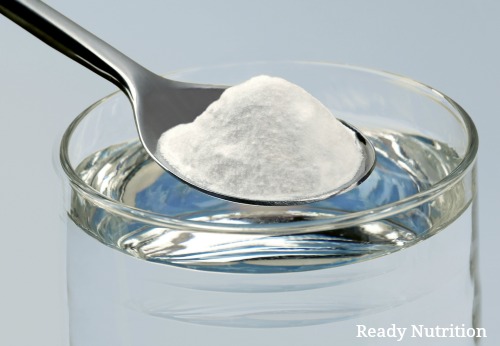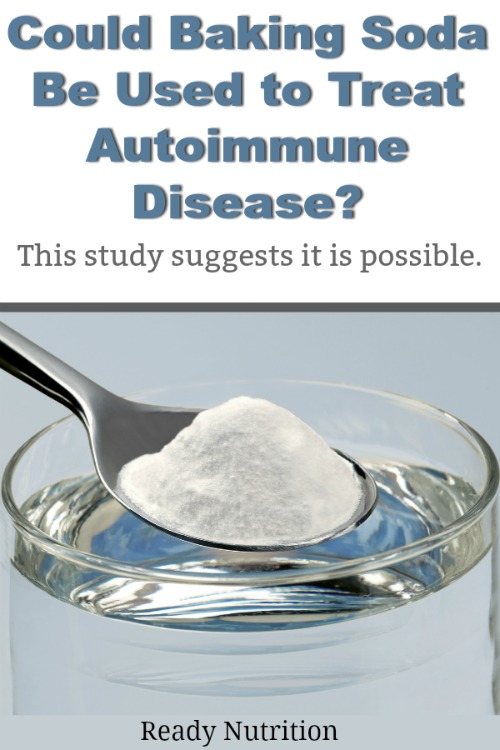
Odds are, you have a box sitting in your pantry or refrigerator right now.
This inexpensive, versatile, and safe product can be used for so many things, including brushing your teeth, treating insect bites and stings, soothing sunburn, as an underarm deodorant, cleaning wounds and preventing infections, and heartburn relief.
Now, yet another possible purpose for baking soda has been discovered, and it is quite incredible.
Scientists have found evidence that a daily dose of baking soda may help reduce the destructive inflammation of autoimmune diseases like rheumatoid arthritis.
Baking soda (sodium bicarbonate) can encourage the spleen to promote an anti-inflammatory environment that could be therapeutic in the face of inflammatory disease, Medical College of Georgia scientists report in The Journal of Immunology.
The research found that when rats or healthy people drink a solution of baking soda and water, it becomes a trigger for the stomach to make more acid to digest the next meal and for mesothelial cells sitting on the spleen to tell the organ that there’s no need to launch a protective immune response.
Mesothelial cells are found in your blood and kidneys, and baking soda is already used in the treatment of chronic kidney disease. It was this that led the researchers to explore the mechanisms by which baking soda benefits renal function, slowing the progression of kidney disease. During this investigation, the scientists noticed that baking soda shifted the balance of immune cells in the kidneys, boosting anti-inflammatory immune cells while simultaneously decreasing inflammatory cells.
The scientists believe that drinking the baking soda-water solution tells the spleen – which is part of the immune system and acts like a big blood filter and is where some white blood cells, like macrophages, are stored – to go easy on the immune response.
In a press release, Dr. Paul O’Connor, a renal physiologist in the MCG Department of Physiology at Augusta University and the study’s corresponding author, said: “Certainly drinking bicarbonate affects the spleen and we think it’s through the mesothelial cells.”
“The shift from inflammatory to an anti-inflammatory profile is happening everywhere,” O’Connor says. “We saw it in the kidneys, we saw it in the spleen, now we see it in the peripheral blood.”
Here’s more detail, from the press release:
In the spleen, as well as the blood and kidneys, they found after drinking water with baking soda for two weeks, the population of immune cells called macrophages, shifted from primarily those that promote inflammation, called M1, to those that reduce it, called M2. Macrophages, perhaps best known for their ability to consume garbage in the body like debris from injured or dead cells, are early arrivers to a call for an immune response.
O’Connor said the shifting landscape is likely due to increased conversion of some of the proinflammatory cells to anti-inflammatory ones coupled with actual production of more anti-inflammatory macrophages.
The researchers also saw a shift in other immune cell types, like more regulatory T cells, which generally drive down the immune response and help keep the immune system from attacking our own tissues. That anti-inflammatory shift was sustained for at least four hours in humans and three days in rats.
Before you run to your pantry to grab the baking soda, a word of caution: O’Connor warns that the baking soda solution has only been tested on rodents and people without inflammation, reports Mother Nature Network:
“It could have potential, but there’s no data behind it,” he says. “Whether or not it can have a significant effect we don’t know. There’s still more testing to come.” There’s no advantage to trying it in the meantime, he says. Baking soda has high levels of sodium, which is linked to heart, kidney and other issues.
“You certainly shouldn’t go start drinking baking soda and water without consulting a physician. I certainly wouldn’t advise people trying this at home,” he says.
However, O’Connor believes the research is promising because, if it works, it could offer a safe alternative to medication:
“You are not really turning anything off or on, you are just pushing it toward one side by giving an anti-inflammatory stimulus,” he says, in this case, away from harmful inflammation. “It’s potentially a really safe way to treat inflammatory disease.”
Using baking soda on the body and for cleaning items around the home are generally considered safe. However, it is possible to consume too much, so be careful not to exceed the recommended dose. Too much baking soda can upset the body’s acid-base balance leading to nausea, vomiting, and abdominal pain. In rare cases, baking soda overdose can lead to seizures, coma, and death. It is very high in sodium and can raise blood pressure and cause swelling.


You can also reach for colloidal silver, Vitamin-C, Vitamin-D, Zinc, Selenium and multitudes of other things.